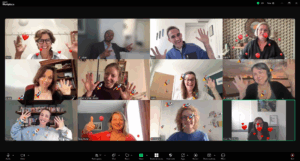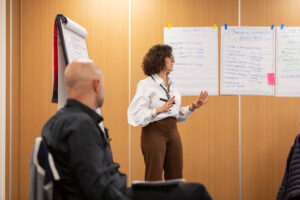Why Addressing Team Toxicity Matters
Toxic communication in teams don’t just create tension—they actively undermine collaboration, morale, and performance. Unchecked, these patterns can lead to disengagement, high turnover, and a breakdown in trust.
Research by Gottman Institute on toxic communication patterns has been replicated in corporate settings, showing that the same communication styles that erode personal relationships can also destroy professional ones. This is why tools like the Team Toxin Grid are invaluable—they help teams identify, take responsibility for, and transform toxic communication into constructive communication patterns.
Understanding Toxic Team Communication
What Are Team Toxins?
Toxic communication are often unconscious patterns that emerge in high-stakes or high-pressure environments. These patterns can feel “normal” within a team, but over time, they corrode psychological safety and trust.
The four core team toxins that compromise team performance are:
- Blaming (Criticism) – Aggressive attack, bullying, harsh start-ups, chronic criticism, and domination.
- Defensiveness – Refusing to take responsibility, shifting blame, and resisting feedback.
- Stonewalling (Withdrawal) – Avoiding discussions, disengaging, withholding, or becoming uncooperative.
- Contempt – Cutting others down, sarcasm, hostile gossip, undermining, and disrespect.
The Hidden Cost of Unchecked Toxicity
- Toxic behaviours become normalised when left unaddressed.
- Psychological safety is compromised, making it difficult for teams to work collaboratively.
- Productivity declines as conflict escalates or is avoided altogether.
- High turnover and burnout increase due to the stress of an unhealthy work environment.
Walking the Team Toxin Grid: A Tool for Transformation
What Is the Team Toxin Grid?
The Team Toxin Grid is a practical, interactive tool that helps teams recognise, take responsibility for, and shift toxic behaviors. By using this framework, teams move from unskillful communication to ownership, moving away from destructive communication patterns towards communication styles which facilitate debates and finding innovative solutions.
How to Facilitate the Team Toxin Grid Exercise
- Educate the Team – share data and information that all teams exhibit some level of team toxins and how they impact team dynamics.
- Create the Grid – Set up a physical or visual grid with four quadrants labeled Blaming, Defensiveness, Contempt, and Stonewalling.
- Step Into the Grid – invite Team members to physically or using a sticky note to position themselves in the quadrant that represents their common communication style during conflict.
- Facilitate Reflection and Discussion:
- What patterns emerge within the team?
- How do these behaviors impact collaboration and trust?
- What deeper needs or fears might be driving these behaviours?
- Explore the Antidotes – coach the team in identifying healthier alternatives to these toxic communication styles
Turning Awareness into Action: Designing Constructive Conflict Protocols
As team leads and coaches this is our focus to coach the team towards commitment to change communication style during periods of disruption (or change).
Awareness alone isn’t enough—teams need clear commitments and practical strategies to shift away from toxic patterns. Here’s how teams can integrate antidotes into their daily interactions:
| Moving from Toxic Communication | Towards Constructive Alternative |
| Blaming | Use “I” statements and offer clear, constructive feedback. |
| Defensiveness | Listen for the 2% truth in feedback and acknowledge it. |
| Stonewalling | Encourage open dialogue, schedule debriefs, and check in regularly. |
| Contempt | Replace criticism with appreciation and mutual respect. |
Teams are encouraged to consciously design their communication norms by creating shared agreements on how to engage in healthy communication during conflict to foster trust
Embracing Responsibility for Team Culture
Transforming toxicity in teams requires awareness, accountability, and action. The Team Toxin Grid is a powerful tool that helps teams identify unhelpful communication styles, take responsibility for their impact, and commit to healthier ways of communicating when the stakes are high
True transformation comes when teams practice and embed conflict protocol and hold each other accountable for fostering a culture that fosters respect, openness, and growth.
Join us for Fundamentals of ORSC in London this May
If you’re ready to learn skills and tools that enable you to coach your teams to the next level, then ORSC is the next step. By shifting from reactivity to responsibility, teams create environments where trust, collaboration, and innovation can truly thrive, and where team members focus on the delivery of their goals.
We introduce the Team Toxin Grid tool in the Fundamentals of ORSC module. Join us either virtually or In-Person in May to start your ORSC journey. You could complete the entire ORSC training as early as July!






